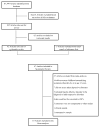Do childhood externalizing disorders predict adult depression? A meta-analysis
- PMID: 24652486
- PMCID: PMC4167173
- DOI: 10.1007/s10802-014-9867-8
Do childhood externalizing disorders predict adult depression? A meta-analysis
Erratum in
- J Abnorm Child Psychol. 2014 Oct;42(7):1115-6
Abstract
Childhood externalizing disorders have been linked to adult affective disorders, although some studies fail to substantiate this finding. Multiple longitudinal cohort studies identifying childhood psychopathology and their association with adult psychiatric illness have been published. To examine the association between childhood externalizing symptoms or disorders and the development of adult depression across cohorts, a meta-analysis was performed. Potential studies were identified using a PubMed search through November 2013. All published, prospective, longitudinal, community-sampled cohort studies of children (≤ 13 years) with externalizing symptoms or disorders (aggression, conduct problems, oppositional defiant disorder, conduct disorder), reassessed in adulthood (≥ 18 years) for depressive disorders (major depressive disorder, depressive disorder NOS, or dysthymic disorder) were included. A random effects model was used to summarize the pooled effect sizes. Ancillary analyses considered covariates that could account for variance among studies. Ten studies representing eight cohorts of children initially assessed at age 13 or younger (N = 17,712) were included in the meta-analysis. Childhood externalizing behavior was associated with adult depressive disorders (OR = 1.52, 95% confidence interval = 1.27-1.80, p < 0.0001). Utilizing Orwin's Fail-safe N approach, 263 studies with a mean odds ratio of 1.0 would have to be added to the analysis before the cumulative effect would become trivial. Externalizing psychopathology in childhood is associated with the development of unipolar depressive disorders in adulthood.
Figures


Similar articles
-
Externalizing and internalizing symptoms in childhood and adolescence and the risk of alcohol use disorders in young adulthood: A meta-analysis of longitudinal studies.Aust N Z J Psychiatry. 2019 Oct;53(10):965-975. doi: 10.1177/0004867419844308. Epub 2019 Apr 29. Aust N Z J Psychiatry. 2019. PMID: 31035781
-
Childhood externalizing and internalizing psychopathology in the prediction of early substance use.Addiction. 2004 Dec;99(12):1548-59. doi: 10.1111/j.1360-0443.2004.00893.x. Addiction. 2004. PMID: 15585046
-
Maternal smoking in pregnancy and externalizing behavior in 18-month-old children: results from a population-based prospective study.J Am Acad Child Adolesc Psychiatry. 2009 Mar;48(3):283-289. doi: 10.1097/CHI.0b013e318195bcfb. J Am Acad Child Adolesc Psychiatry. 2009. PMID: 19242291
-
[Mood disorders in childhood and adolescence: continuities and discontinuities to adulthood].Psychiatriki. 2012 Jun;23 Suppl 1:94-100. Psychiatriki. 2012. PMID: 22796978 Review. Greek, Modern.
-
Childhood Psychiatric Disorders as Risk Factor for Subsequent Substance Abuse: A Meta-Analysis.J Am Acad Child Adolesc Psychiatry. 2017 Jul;56(7):556-569. doi: 10.1016/j.jaac.2017.05.004. Epub 2017 May 11. J Am Acad Child Adolesc Psychiatry. 2017. PMID: 28647007 Review.
Cited by
-
Right frontal cingulate cortex mediates the effect of prenatal complications on youth internalizing behaviors.Mol Psychiatry. 2024 Jul;29(7):2074-2083. doi: 10.1038/s41380-024-02475-y. Epub 2024 Feb 20. Mol Psychiatry. 2024. PMID: 38378927 Free PMC article.
-
RDoC and Psychopathology among Youth: Misplaced Assumptions and an Agenda for Future Research.J Clin Child Adolesc Psychol. 2020 May-Jun;49(3):322-340. doi: 10.1080/15374416.2020.1750022. J Clin Child Adolesc Psychol. 2020. PMID: 32525746 Free PMC article.
-
A social-development model of the evolution of depressive symptoms from age 13 to 30.Dev Psychopathol. 2024 Feb;36(1):280-290. doi: 10.1017/S0954579422001183. Epub 2022 Dec 1. Dev Psychopathol. 2024. PMID: 36453112 Free PMC article.
-
Dual Pathways from Reactive Aggression to Depressive Symptoms in Children: Further Examination of the Failure Model.J Abnorm Child Psychol. 2019 Jan;47(1):85-97. doi: 10.1007/s10802-018-0426-6. J Abnorm Child Psychol. 2019. PMID: 29654538
-
Internalizing-externalizing comorbidity and regional brain volumes in the ABCD study.Dev Psychopathol. 2021 Dec;33(5):1620-1633. doi: 10.1017/s0954579421000560. Epub 2021 Dec 7. Dev Psychopathol. 2021. PMID: 36238203 Free PMC article.
References
-
- Angold A, Costello EJ, Erkanli A. Comorbidity. J Child Psychology and Psychiatry. 1999;40:57–87. - PubMed
-
- Angold A, Costello EJ, Farmer EM, Burns BJ, Erkanli A. Impaired but undiagnosed. Journal of the American Academy of Child and Adolescent Psychiatry. 1999;38:129–137. - PubMed
-
- Bank L, Duncan T, Patterson GR, Reid J. Parent and teacher ratings in the assessment and prediction of antisocial and delinquent behaviors. J of Personality. 1993;61:693–709. - PubMed
-
- Beardslee WR, Gladstone TR, O’Connor EE. Developmental risk of depression: Experience matters. Child and Adolescent Psychiatric Clinics of North America. 2012;21:261–278. vii. - PubMed
Publication types
MeSH terms
Grants and funding
LinkOut - more resources
Full Text Sources
Other Literature Sources

